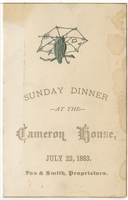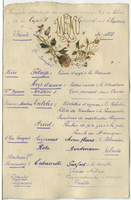Search the Special Collections and Archives Portal
Search Results
Claytee D. White oral history interview
Identifier
Abstract
Oral history interview with Claytee D. White conducted by Stefani Evans on November 2, 2023 for the African Americans in Las Vegas: a Collaborative Oral History Project. In this interview, Claytee D. White, founding directory of the Oral History Research Center at UNLV Libraries, celebrates the twentieth anniversary of the OHRC by contributing her oral history to the collection.
She begins by explaining how the system of sharecropping worked in her family near rural Ahoskie, North Carolina, and she talks about the field work involved in raising cotton, tobacco, corn, and peanuts. The fifth of eight children and the first daughter, she shares memories of going into town with her mother, of admiring her women teachers, and of attending North Carolina Central College (now University) for two years before moving to Washington, D.C., and working for the telephone company.
After recalling her two years in D.C. and 22 years in Los Angeles, California, she describes "running away" to Las Vegas, Nevada in the early 1990s. Here, at the History department at UNLV, she recalls learning to conduct oral histories. White shares memories of her first interviews with Hazel and Jimmy Gay and Lucille Bryant. She talks of matriculating to the College of William and Mary for her PhD and of returning to Bertie County to live with her mother and administer the office of The Shaw University Center for Alternative Programs in Education (CAPE). She describes how she was offered the position of OHRC founding director, why it matters that she was an "opportunity hire," and how it feels to be the only Black person in a room.
Archival Collection
D. Taylor oral history interview
Identifier
Abstract
Oral history interview with D. Taylor conducted by Claytee White on July 25, 2014 for the Boyer Early Las Vegas Oral History Project. Taylor recalls the 1984 Culinary Workers Union Local 226 citywide strike for improved health coverage for employees. He also talks about the history of the labor union, its leadership, and the union representative structure giving a larger voice to the racially diverse workforce in Las Vegas, Nevada.
Archival Collection

Christine Szukala oral history interview: transcript
Date
Archival Collection
Description
Oral history interview with Christine Szukala conducted by Bridgette Foote on November 12, 2021 for Reflections: The Las Vegas Asian American and Pacific Islander Oral History Project. Christine shares her family history and the story of her Thai mother and American Air Force father who met in Thailand and married before moving to the United States in 1970. She talks about her upbringing in Las Vegas, Nevada near Nellis Air Force base with her six siblings. Christine discusses her beliefs of how her newly immigrated mother adapted to American life, including altering her recipes to fit her husband's taste and reducing her visits to nearby Buddhist temples.
Text
Daniel Long oral history interview
Identifier
Abstract
Oral history interview with Daniel Long conducted by John Griebling on February 28, 1980 for the Ralph Roske Oral History Project on Early Las Vegas. In this interview, Long talks about his job history with Southwest Gas Company. He specifically talks about the growth of the company and his experiences there.
Archival Collection
H. P. Fitzgerald oral history interview
Identifier
Abstract
Oral history interview with H. P. Fitzgerald conducted by Kathlyn Wilson on March 09, 1975 for the Ralph Roske Oral History Project on Early Las Vegas. Fitzgerald discusses black history in Las Vegas, Nevada. He also talks about school integration and being one of the first black administrators for Clark County School District.
Archival Collection
Site Characterization and Validation: Final Report - Stripa Project 92-22, 1992 April
Level of Description
Archival Collection
Collection Name: Yucca Mountain Site Characterization Office Collection
Box/Folder: Box 82
Archival Component

Cameron House, menu, Sunday, July 22, 1883
Date
Archival Collection
Description
Text

Café de Paris, menu, June 22, 1888
Date
Archival Collection
Description
Text
Roy D. Baker oral history interview
Identifier
Abstract
Oral history interview with Roy D. Baker conducted by Dennis McBride February 08, 2004 for the Las Vegas Gay, Lesbian, Bisexual, and Transgender Archives Oral History Project. In this interview, Baker discusses Fred Schoonmaker, a Reno, Nevada gay activist and his husband, Alfred Parkinson. Baker details their efforts to create Stonewall Park, a town for LGBTQ members in Nevada that was never realized. Schoonmaker attempted to establish Stonewall Park three times in three different locations: Silver Springs, Nevada; Rhyolite, Nevada; and Thunder Mountain, Nevada. Baker talks about his personal relationship with Schoonmaker, his opinion on Stonewall Park, and legal issues that Schoonmaker faced during the development of the town. Baker describes opposition from local residents against Stonewall Park and Schoonmaker's health after being diagnosed with HIV.
Archival Collection

Café de Paris, menu, July 22nd, 1888
Date
Archival Collection
Description
Text
